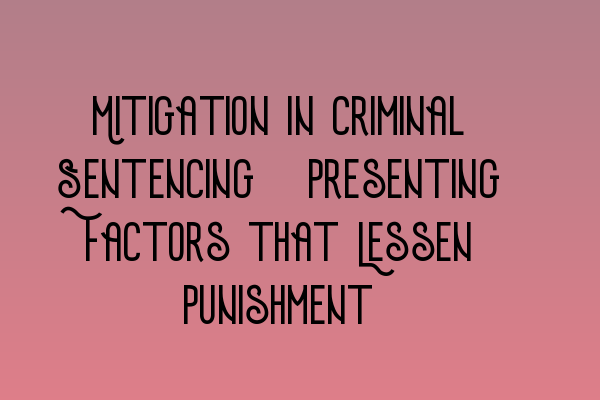Mitigation in Criminal Sentencing: Presenting Factors that Lessen Punishment
Mitigation plays a significant role in criminal sentencing, allowing for the presentation of factors that can lessen the punishment imposed. Understanding how to effectively present mitigating factors can greatly impact the outcome of a case and potentially result in a reduced sentence. This article will explore the importance of mitigation in criminal sentencing and provide guidance on how to present relevant factors.
The Role of Mitigation in Criminal Sentencing
When determining a sentence, the court takes into account various factors, including the severity of the offense, the harm caused to the victim, and the defendant’s criminal history. However, mitigating factors can be used to argue for a lesser punishment. Mitigation aims to provide the court with a balanced perspective on the defendant’s circumstances, highlighting any circumstances that may reduce their culpability or demonstrate remorse.
Some common mitigating factors include:
- The defendant’s age, mental capacity, or physical health;
- Previous good character and lack of previous convictions;
- The defendant’s role or level of involvement in the offense;
- Any factors contributing to the commission of the offense, such as coercion or duress;
- The defendant’s genuine remorse or efforts towards rehabilitation;
- Cooperation with the authorities during the investigation or trial.
Presenting Mitigating Factors
Effectively presenting mitigating factors requires careful planning and preparation. A skilled solicitor can guide their client in gathering and presenting relevant evidence to support the mitigation argument. Here are some tips to consider:
- Comprehensive Case Review: A thorough analysis of the case is essential to identify potential mitigating factors. This includes examining the circumstances surrounding the offense and the defendant’s personal background.
- Evidence Collection: Collecting supporting evidence is crucial to substantiate the mitigating factors. This may include medical records, character references, testimonials, or any documentation that can provide insight into the defendant’s character or circumstances.
- Expert Witnesses: Depending on the nature of the case, expert witnesses may be called upon to provide professional opinions or assessments. For example, a mental health professional could testify to the defendant’s mental state at the time of the offense.
- Effective Communication: Clearly and persuasively presenting the mitigating factors during court proceedings is paramount. Solicitors must be prepared to articulate their client’s circumstances and arguments in a manner that resonates with the judge or jury.
It is important to note that the weight given to mitigating factors ultimately rests with the court’s discretion. However, by presenting compelling and relevant evidence, solicitors can increase the likelihood of a favorable outcome for their clients.
Contact SQE Criminal Law & Practice for Professional Guidance
If you require assistance with criminal sentencing and mitigation, SQE Criminal Law & Practice is here to help. Our experienced solicitors have a deep understanding of the complexities surrounding mitigating factors in criminal cases. We offer comprehensive SQE 1 and SQE 2 preparation courses to equip aspiring solicitors with the knowledge and skills necessary to excel in their legal careers.
To enhance your preparation for the SQE exams, we recommend checking out these related articles:
- SQE 1 Practice Exam Questions
- SQE 1 Practice Mocks FLK1 FLK2
- SQE 2 Preparation Courses
- SQE 1 Preparation Courses
- SRA SQE Exam Dates
By investing in a comprehensive preparation program, you can enhance your understanding of criminal law and improve your ability to successfully present mitigating factors in criminal sentencing.
For expert guidance and support, contact SQE Criminal Law & Practice today. Our dedicated team of solicitors is committed to helping you achieve success in your legal career.
